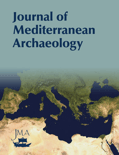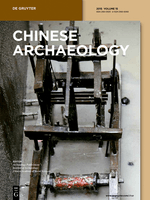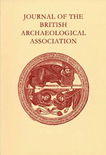
African Archaeological Review
Scope & Guideline
Illuminating Africa's Cultural Narratives
Introduction
Aims and Scopes
- Cultural Heritage Studies:
Exploration of Africa's rich cultural heritage, addressing the significance of archaeological findings in understanding contemporary identities and historical narratives. - Technological Advances in Archaeology:
Utilization of new methodologies, such as geochemical analyses and digital humanities, to enhance archaeological research and interpretation. - Interdisciplinary Approaches:
Integration of various disciplines, including anthropology, history, and environmental studies, to provide a comprehensive understanding of archaeological contexts. - Regional Archaeological Insights:
Focused studies on specific regions within Africa, examining localized cultural practices, trade networks, and social dynamics. - Historical Contextualization:
Analysis of archaeological findings within broader historical frameworks, highlighting interactions between different cultures and societies over time.
Trending and Emerging
- Climate Change and Resilience:
Increasing attention is being paid to how past societies adapted to climate change, offering insights into resilience and sustainable practices that can inform modern strategies. - Digital Archaeology and Visualization Technologies:
The use of advanced technologies, such as GIS and virtual reality, is on the rise, enabling more interactive and accessible archaeological research. - Memory and Identity in Archaeology:
Exploration of how archaeological findings contribute to contemporary understandings of identity and memory, particularly in post-colonial contexts. - Social Archaeology:
A growing emphasis on social dynamics, including gender roles and community interactions, reflects a shift towards understanding the lived experiences of past societies. - Interconnectedness and Global Networks:
Research increasingly highlights the interconnectedness of African societies with global trade networks, emphasizing the importance of transnational interactions.
Declining or Waning
- Traditional Stone Age Studies:
There appears to be a waning focus on the purely technological aspects of the Stone Age, with fewer publications centered on lithic tool analysis and typology. - Eurocentric Narratives:
Research that emphasizes Eurocentric perspectives on African archaeology has decreased, indicating a shift towards more localized and African-centered narratives. - Monocultural Studies:
Examinations of isolated cultures without considering broader contexts or interactions have become less frequent, as scholars increasingly adopt holistic approaches. - Simplistic Trade Models:
The previous focus on straightforward trade models without considering complex socio-economic networks has diminished, paving the way for more nuanced analyses.
Similar Journals

SOUTH AFRICAN ARCHAEOLOGICAL BULLETIN
Connecting Scholars to South Africa's Archaeological Legacy.Welcome to the SOUTH AFRICAN ARCHAEOLOGICAL BULLETIN, a premier academic journal dedicated to the dynamic field of archaeology in South Africa and beyond. Published by the SOUTH AFRICAN ARCHAEOLOGICAL SOC, this journal boasts an impressive Q1 ranking in both Archaeology (arts and humanities) and Archaeology categories as of 2023, placing it among the top tier of scientific journals in its discipline. With an extensive publication history spanning from 2002 to 2023, it serves as a crucial platform for disseminating pioneering research and scholarly discussions that illuminate the rich tapestry of South African archaeological heritage. Although it does not currently offer open access, the journal’s rigorous peer-review process, combined with its standing in the Scopus rankings—where it ranks 78 out of 413 in the arts and humanities and 75 out of 354 in social sciences—underscores its commitment to academic excellence. Researchers, professionals, and students alike will find this journal an essential resource for exploring innovative methodologies, archaeological discoveries, and theoretical advancements shaping the understanding of human history.

Conimbriga-Revista de Arqueologia
Connecting Researchers to the Rich Tapestry of HistoryConimbriga-Revista de Arqueologia is a distinguished open-access journal dedicated to the field of archaeology, published by COIMBRA UNIVERSITY PRESS. Since its inception, the journal has fostered a vibrant intellectual community focused on the exploration and dissemination of archaeological research, particularly emphasizing studies relevant to the rich historical and cultural heritage of Portugal and beyond. With its open access model established in 2014, it has become a vital resource for researchers, professionals, and students to share their findings without access barriers, encouraging collaboration and knowledge exchange. Despite the absence of specific metrics such as the HIndex and Scopus rankings, the journal is recognized for its commitment to high-quality scholarship and its role in advancing archaeological discourse. Positioned within the scholarly landscape, Conimbriga-Revista de Arqueologia serves as a crucial platform for the publication of innovative research, reviews, and critical essays, making it an essential journal for those invested in the archaeological sciences.

Revue Archeologique du Centre de la France
Bridging the Past and Present of Central France's Archaeological StudiesRevue Archeologique du Centre de la France is a prestigious academic journal dedicated to the field of archaeology, with a special focus on the rich historical and cultural heritage of central France. Published by FED EDITION REVUE ARCHEOLOGIQUE CENTRE FRANCE, this journal has been an open-access platform since 2004, ensuring that researchers, professionals, and students can freely access cutting-edge archaeological findings and scholarly discussions. With an acute emphasis on disseminating knowledge and fostering ongoing dialogue in archaeology, Revue Archeologique du Centre de la France serves as a vital resource for those keen to explore the complexities of French archaeological studies. Housed in Tours, this journal not only highlights regional heritage but also situates it within broader archaeological frameworks, making it an essential contribution to the field. Researchers can look forward to engaging with a diverse array of articles that cover both theoretical and applied aspects of archaeology, bolstering the understanding of our shared past.

Complutum
Where History Meets Archeological InsightComplutum, published by the Universidad Complutense de Madrid, serves as a leading academic journal in the fields of Archeology and History. With a notable track record since its inception and a convergence stretching from 2011 to 2024, the journal has established itself as a pivotal platform for scholarly discourse in these disciplines. Recognized in 2023 with a Q2 ranking in Archeology and Arts and Humanities, as well as a Q1 ranking in History, Complutum demonstrates its commitment to quality research, attracting contributions from leading experts and emerging scholars alike. The journal's impact is further evidenced by its competitive ranks within various Scopus categories, particularly its placement in the 77th percentile for History and 64th for Archeology. As a printed publication without open access options, Complutum caters to a specialized audience, providing a forum for in-depth analysis and discussion on archaeological findings and historical interpretations. Researchers, professionals, and students engaged in these fields will find Complutum an invaluable resource for advancing knowledge and fostering academic collaboration.

Journal of Mediterranean Archaeology
Pioneering Research in the Heart of the MediterraneanThe Journal of Mediterranean Archaeology, published by EQUINOX PUBLISHING LTD in the United Kingdom, is a premier academic journal dedicated to the exploration and dissemination of knowledge within the vibrant field of Mediterranean archaeology. Established in 1988, this journal has consistently demonstrated its commitment to scholarly excellence, attaining a Q1 ranking in various categories, including Archaeology and Arts and Humanities, making it a vital resource for researchers and students alike. With a prominent Scopus rank of #49 out of 413 in Archaeology, it places itself among the top-tier publications, reflecting its impact and relevance in contemporary archaeological discourse. Although the journal is not open access, its rigorous peer-review process ensures the publication of high-quality scholarly articles that contribute significantly to the understanding of the diverse cultural narratives within the Mediterranean region. As the journal moves toward its 35th anniversary, it continues to be a cornerstone for professionals seeking to share groundbreaking research and dialogue in this critically important area of study.

Azania-Archaeological Research in Africa
Bridging the Past and Present of African Archaeology.Azania-Archaeological Research in Africa, published by Routledge Journals, Taylor & Francis Ltd, stands as a premier academic resource in the field of archaeology, specifically focusing on African archaeological research. With a remarkable tradition dating back to 1966, the journal spans over half a century of rigorous scholarship, aiming to enrich our understanding of Africa's diverse cultural and historical narratives. Currently indexed in the prestigious Q1 category for both Archaeology and Arts and Humanities, it ranks impressively in the Scopus database, placing within the top 12% of journals in its field. This commitment to excellence facilitates the dissemination of innovative and insightful research, catering to a broad audience of researchers, professionals, and students alike. While the journal is not open access, its impactful contributions continue to shape contemporary archaeological discourse, making it an essential resource for anyone passionate about the study of Africa's archaeological heritage.

Chinese Archaeology
Advancing Insights into Ancient CivilizationsChinese Archaeology, published by WALTER DE GRUYTER GMBH, is a leading journal dedicated to the exploration and study of China's rich archaeological heritage. With an ISSN of 2160-5025 and an E-ISSN of 2160-5068, this journal serves as an essential platform for scholars, researchers, and enthusiasts in the field of archaeology, offering a blend of original research articles, reviews, and critical essays that address both contemporary issues and historical narratives. While it currently operates under a conventional access model, making cutting-edge research available to a select audience, it plays a crucial role in advancing knowledge about China's archaeological sites, artifacts, and past civilizations. Given the increasing interest in Eastern archaeology and its significance in a global context, Chinese Archaeology is positioned as a pivotal resource for understanding and interpreting the complexities of China’s historical evolution. Researchers and academics are encouraged to contribute and engage with this vital field of study to foster greater insights and innovations.

California Archaeology
Exploring the Depths of California's Cultural HistoryCalifornia Archaeology is a premier academic journal dedicated to the multifaceted study of archaeology within the context of California's rich historical and cultural landscape. Published by Routledge Journals, Taylor & Francis Ltd, this journal conveys cutting-edge research from 2009 to 2024 and is recognized for its impact in the field, with a commendable Q2 ranking in both archaeology and arts and humanities as of 2023. Scholars and practitioners are encouraged to disseminate their findings and insights through this journal, contributing to a deeper understanding of archaeological practices and interpretations in California. With access options designed to enhance the visibility of research, California Archaeology serves as an essential resource for professionals, students, and researchers devoted to advancing knowledge in archaeology, making it a cornerstone of academic discourse in the discipline.

Virtual Archaeology Review
Fostering Multidisciplinary Collaboration in Heritage Preservation.Virtual Archaeology Review, published by UNIV POLITECNICA VALENCIA, EDITORIAL UPV, is a distinguished open-access journal dedicated to the dynamic fields of archaeology and conservation. Based in Spain, this journal has made a significant impact in the academic community, reflected in its outstanding Q1 ranking in Archeology and Conservation for 2023, alongside impressive standings in related disciplines such as Computer Science Applications. With an active commitment to promoting the accessibility of knowledge since 2010, it provides a platform for researchers, professionals, and students to share innovative findings and methodologies in virtual archaeology, fostering collaboration across disciplines. The journal's impact factor and its strategic focus on advancing the practice of virtual methodologies in archaeology underscore its vital role in bridging technology and heritage studies. By embracing a multidisciplinary approach, Virtual Archaeology Review not only enhances academic discourse but also drives the development of effective conservation strategies, making it an essential resource for those dedicated to the preservation and appreciation of our cultural heritage.

Journal of the British Archaeological Association
Connecting Scholars to Britain's Archaeological NarrativeJournal of the British Archaeological Association is a prestigious publication in the field of archaeology, dedicated to fostering scholarly dialogue and advancing research related to Britain's rich archaeological heritage. Published by Routledge Journals, Taylor & Francis Ltd, this journal serves as a vital platform for researchers, professionals, and students alike, offering insights into archaeological practices and findings from the United Kingdom and beyond. With an ISSN of 0068-1288 and an E-ISSN of 1747-6704, the journal has a notable history spanning from 1980 to the present, contributing significantly to the academic community. Currently categorized within Quartile 4 for archaeology and visual arts, it serves as a resource for emerging researchers while promoting innovative perspectives in archaeology. Although it operates under a traditional subscription access model, the quality and depth of content delve into significant archaeological discussions, making it an essential read for those seeking to broaden their understanding of archaeological methodologies and theories. The association's commitment to preserving and interpreting archaeological data ensures that the Journal of the British Archaeological Association remains an indispensable resource for anyone passionate about uncovering the past.